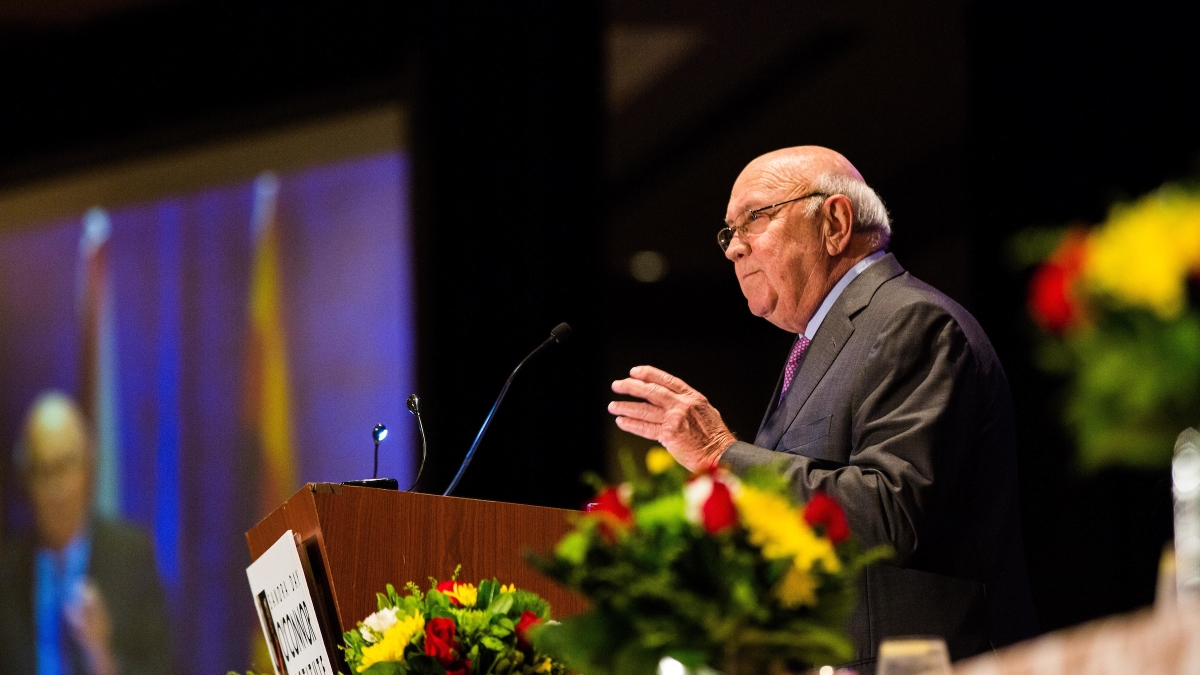F.W. De Klerk encourages support for ethical leaders at ASU event

The man who helped to end apartheid in South Africa said it’s in the best interests of the developed world to encourage ethical leadership in the developing world.
F.W. de Klerk, former president of South Africa, spoke at a luncheon sponsored by the Sandra Day O’Connor Institute, Arizona State University and the Thunderbird School of Global Management. De Klerk, president from 1989 to 1994, helped to broker the end of apartheid, South Africa's system of racial segregation and discrimination, and supported the transformation of the country into a non-racial democracy.
To do it, he worked with Nelson Mandela, an opposition political leader, who had been jailed in 1962 on charges of conspiring to overthrow the state. In 1990, de Klerk ordered the release of Mandela, who served as the country’s first black president from 1994 to 1999.
In 1993, de Klerk and Mandela were jointly awarded the Nobel Peace Prize for their work in ending apartheid.
Building humane leadership in developing countries is important for world stability, he said.
“The sad reality is that history has more often been driven by bad rather than good leadership,” he said.
“One thing we have learned since the beginning of the millennium and from globalization is that none of us can ignore developments in even the most remote societies.”
De Klerk said that he learned that power is corrosive and must be subject to checks and balances, and not based on ideology, with apartheid as an example of ideology run amok. De Klerk said he supported apartheid as a young man.
“I have made a profound apology," he said. "I apologized for the pain and devastation it has caused to millions of people.
“And we went further in South Africa. We didn’t only apologize. It was my privilege that under my presidency, we abandoned apartheid.”
A key factor in good leadership is respect for diversity, said de Klerk, who noted that under its new constitution, South Africa recognized 11 official languages.
“You manage diversity by having rules in place that allow space for the existences and acknowledgement of minorities as building blocks — not as stumbling blocks standing in the way of the greater good,” he said.
To help foster leadership in developing countries, de Klerk founded the Global Leadership Foundation in 2004, which includes more than 40 former presidents, prime ministers and statesmen.
“We understand the loneliness of leadership. We know that many of our closest allies and advisers have their own agendas,” he said. “And we operate with discretion, because the last thing a leader wants is to create the impression that he needs external advice. So we operate beneath the radar.”
De Klerk said that some people are born leaders and some are created in historic times.
“In the end, leadership was thrust upon me,” he said. “But we must create sensible platforms that can deliver such leaders.”
He said that countries embroiled in violence must pause, even temporarily.
“They must bring an end to the violence even for a limited period to create room and space for consensus-seeking dialogue. From such dialogue, leaders will emerge.”
De Klerk said he appreciated the mission of former Supreme Court Justice Sandra Day O’Connor, who spoke briefly at the luncheon, and her institute.
“I know I am among like-minded people who share your vision that it is possible to solve important social, economic and political problems through civil discussion and civic action.”
Photo: Former South African President F.W. de Klerk says building humane leadership in developing countries is important for world stability. He spoke during the Distinguished Speakers Series put on by the Sandra Day O'Connor Institute on Sept. 26 at the Montelucia Resort in Scottsdale. Photo by Deanna Dent/ASU Now
More Local, national and global affairs

Expert discusses America's place in outer space with ASU students
If you asked Esther Brimmer about what security issue the United States should focus on next, she might say the moon. In fact, that’s exactly what she recently told a student at an event hosted by…
Arizona nonprofits eager for guidance to address changing federal policies, ASU report finds
In the weeks following a series of executive orders reducing federal funding, including grants to nonprofits, Arizona State University’s Lodestar Center for Philanthropy and Nonprofit Innovation…

Watts College launches program to fill jobs created by pending public service retirements
Within the next decade, a “silver tsunami” of employees will retire from public service, according to Arizona State University School of Public Affairs Director Shannon Portillo.The huge…

